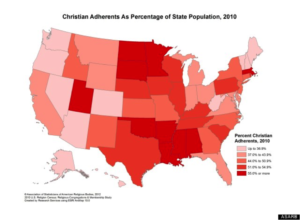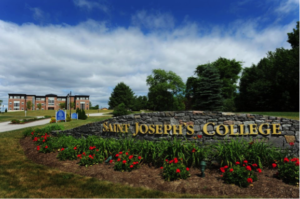 The Huffington Post reported on the to-date most comprehensive statistical study of religious bodies in the U.S. and, specifically, a state by state look at the percentage of Christians, as self-reported.* Maine fared the worst, with only 27% identifying as Christian, while Utah was at the top with 78%. Northern New England is among the least Christian in the nation, according to this 2010 study, and I would venture that at least the Maine stats are lower in 2015 than 2010. Saint Joseph’s College is the only Catholic college remaining in Maine, and there are but three Catholic high schools, two in Portland and one about 45 minutes away, in a state that covers a huge geographical area.
The Huffington Post reported on the to-date most comprehensive statistical study of religious bodies in the U.S. and, specifically, a state by state look at the percentage of Christians, as self-reported.* Maine fared the worst, with only 27% identifying as Christian, while Utah was at the top with 78%. Northern New England is among the least Christian in the nation, according to this 2010 study, and I would venture that at least the Maine stats are lower in 2015 than 2010. Saint Joseph’s College is the only Catholic college remaining in Maine, and there are but three Catholic high schools, two in Portland and one about 45 minutes away, in a state that covers a huge geographical area.
When I moved to Maine almost three years ago, it was a shock to the system. I had to work harder at being “intentionally” Catholic. Most churches have only one Mass on Sundays, and it is even more difficult to get to Mass on Holy Days of Obligation. Because of the shortage of priests, they have become like the “priests on horseback” of old, traveling great distances to attend to the sacramental and pastoral needs of the faithful in parishes consisting of “clusters” of individual churches several towns apart. I taught the high school faith formation class in the local church, with a scant four regular students attending, all girls in grades 9-12, one of whom was my daughter. This is vastly different from the metro-NY area from which I came, where there was a palpable Catholic rhythm to life that was easy to spot for the aware. I could roll out of bed any time on Sunday and find an available Mass in any number of churches close to home. Daily Mass was a breeze, with so many options, and just five minutes from my house was a shrine with priests to hear Confessions from 8:00 a.m. to 7:00 p.m., and if the penitent needed absolution right away, a priest would answer the door until 11:00 p.m.
 Saint Joseph’s College has become a Catholic haven, of sorts, for me, because during the school year we are blessed with a priest on campus who offers weekday Masses and a Sunday afternoon Mass that late sleepers can appreciate. Everywhere I look I see crucifixes, meatless cafeteria-food Fridays in Lent, and opportunities for prayer. I pass the welcoming statue of the Venerable Catherine McAuley, foundress of the Sisters of Mercy, and the college campus regularly peppered with quotes from her, such as:
Saint Joseph’s College has become a Catholic haven, of sorts, for me, because during the school year we are blessed with a priest on campus who offers weekday Masses and a Sunday afternoon Mass that late sleepers can appreciate. Everywhere I look I see crucifixes, meatless cafeteria-food Fridays in Lent, and opportunities for prayer. I pass the welcoming statue of the Venerable Catherine McAuley, foundress of the Sisters of Mercy, and the college campus regularly peppered with quotes from her, such as:
Mercy receives the ungrateful again and again, and is never weary of pardoning them.
If the love of God really reigns in your heart, it will show itself in the exterior.
No occupation should withdraw our minds from God. Our whole life should be a continual act of praise and prayer.
As I turn into the campus driveway every morning (aptly named McAuley Drive), I pass the sign bearing our patron’s name and offer a little prayer to Saint Joseph for the well-being of our college community.
While the state of Maine may be the least self-identified “churched” population, the “state” of Saint Joseph’s College Online Theology Community may be among the most “churched” population in the nation. Our large body of online theology students comes from all over the United States and beyond its borders to learn and drink in the beauty of the Catholic faith. Our on-campus and online theology faculty possess the Mandatum to teach according to Ex Corde Ecclesiae. Our theology family-at-a-distance, by virtue of being tethered in mind, heart, and spirit to our beautiful campus on the shores of Sebago Lake—dare I say—maybe inches us towards the “most” Christian state—if not in the whole perhaps in the little plot of land in Standish, Maine, where Saint Joseph’s College calls home.
Patricia Sodano Ireland is Dean of Undergraduate Studies and Program Director of Online Theology Programs at Saint Joseph’s College of Maine.

